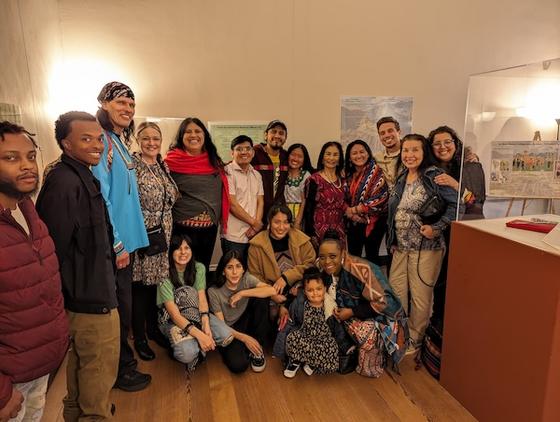George Mason University associate professor Gabrielle Tayac’s course, HIST 397 Public History in Action, looks at how indigenous communities interact with our student population through community-based engagement and projects.
“Like anywhere in the Americas, George Mason is indigenous land, but we’re trying to get a sense of the interplay between past and present,” said Tayac, who is a member of the Piscataway Indian Nation. “My goal is to get students ready for museum work, give them accessible history, and guide them to work really deeply with communities.”

Tayac and research partner the Center for Humanities Research (CHR) applied for and received an Access to Research and Inclusive Excellence (ARIE) grant for their project, “IndigenoUs Northern Virginia.”
This project, completed by students in the Spring 2024 course, is in the form of an exhibit titled “Offerings for Tauxenent: Acknowledging Indigenous Place” at the National Trust for Historic Preservation, another project partner through George Mason alum James Wells, BA History ’22.
Wells previously took this course with Tayac and reached out to inform her of an open space at Woodlawn, which he offered as a place for current students to look at what the indigenous reality is and what needs to be remembered, explained Tayac.
“Professor Tayac’s class was one of my first real exposures to Indigenous history and cultures. It was really eye-opening,” said Wells, who came to George Mason from Northern Virginia Community College through the ADVANCE Program and was a member of George Mason’s student organization Native American and Indigenous Alliance.
“This exhibit was the most crowded I’ve seen Woodlawn in the two years that I’ve worked here. The work the students did on this project made that possible and opened the door for us to interpret Indigenous histories at our site,” said Wells, a program assistant at Woodlawn & Pope-Leighey House, one of National Trust for Historic Preservation’s locations.

For the project, the students were divided into three teams, focusing on different Indigenous communities: the International Mayan League, Indigenous Andean, and a combination of local tribes including the Doeg, Intertribal urban community, Piscataway, and Rappahannock tribes.
The groups had to collect research, objects, and images to produce interactive art and media that accurately represent their assigned Indigenous communities.
History graduate student Odessa Lamborn worked on this project during their last semester as an undergraduate student at George Mason.
“The mission of the project is about bringing awareness to the Indigenous and First Nations people in the Washington, D.C., area,” said Lamborn. “It was a really phenomenal experience being able to collaborate with Indigenous people in the area and uplift their voices.”
Lamborn is now working alongside Wells as a historical interpreter at Woodlawn & Pope-Leighey House.
“This project gave me great insight into the behind the scenes of creating exhibits for the public, and it also influences my current work at Woodlawn with the tours I provide,” said Lamborn. “I make sure to point out where we have a John Smith map, detailing Indigenous culture [from before] colonization.”
Some of the students in Tayac’s course contributed their original art or personal objects to the exhibit as well.
“This whole project was basically what I want to do as my professional career once I graduate,” said senior and history major Sinead Monaghan.
“I’ve gotten to take a lot of classes with Professor Tayac, and I’m so grateful for all her guidance,” said Monaghan. “What we're doing goes beyond the classroom and makes a valuable impact in the world beyond. If it just touches one person or changes the way one person thinks, then it will have done its job.”
The exhibit is being brought to George Mason’s Fairfax Campus in 2025 through Mason Exhibitions and will open on April 15 as “Offerings to the Potomac: Acknowledging Indigenous Place.”

In This Story
Related News
- February 18, 2026
- February 18, 2026
- February 16, 2026
- February 16, 2026
- February 9, 2026
